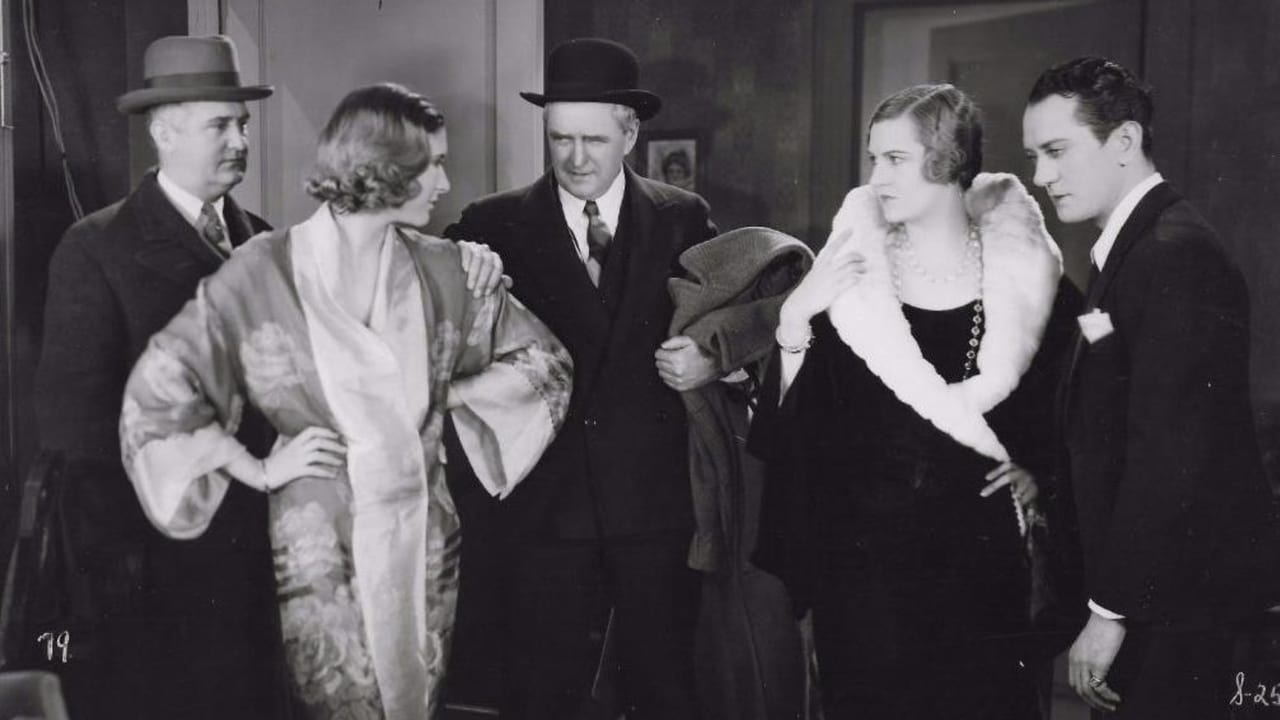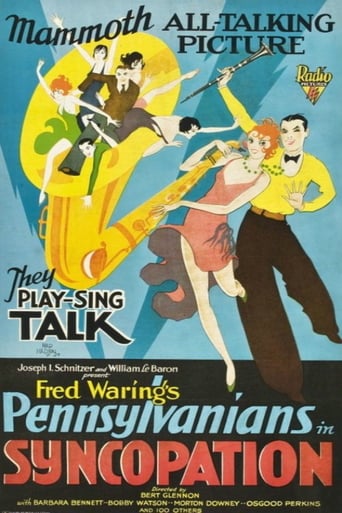

I have absolutely never seen anything like this movie before. You have to see this movie.
... View MoreThe film may be flawed, but its message is not.
... View MoreThis movie tries so hard to be funny, yet it falls flat every time. Just another example of recycled ideas repackaged with women in an attempt to appeal to a certain audience.
... View MoreStrong acting helps the film overcome an uncertain premise and create characters that hold our attention absolutely.
... View More"Syncopation" was the first film released under the Radio banner and the first to use R.C.A's Photophone sound system. Popular Fred Waring and His Pennsylvanians were top billed but even though they played six numbers including "Jericho" which became the hit of the movie, they were used more as "box office bait", designed to lure the patrons into the movie. The casting of the leads was lack lustre - Barbara Bennett was attractive but didn't have the charisma of her sisters Joan and Constance, and Bobby Watson was really nobody's idea of a romantic lead. They played Benny Darrel and Flo Sloane, a husband and wife dance team who are given stellar spots in a top New York night spot. Along comes handsome playboy Alexander Winston (Ian Hunter) who hopes to woo Flo away from "uncouth" Benny who prefers to hang around with his unsophisticated Broadway buddies. It didn't help Barbara that she had an unsympathetic part but didn't have the acting skills to bring the audience over to her side. From the first scene her Flo is carping and complaining that Benny has dragged her down to his level - "I've got the face and figure to be somebody"!!One person in the cast that that could apply to is Dorothy Lee who provides the movie with pep and sparkle. She plays dumb-bell Peggy the tag along girl friend of live wire song writer Lew Lewis (Morton Downey) whose catch phrase "Say that sounds like a great title for a song" became a catch phrase "ad nausea" for countless movie musicals. The first musical interlude features Waring and his band in riding jodphurs and paper hats!! then Flo and Benny go into their routine - an extended dance performance to "Sweet Mystery of Life" but it goes on and on for so long, especially when you really can't tell whether it is the stars who are dancing or just a pair of "ring in" professionals!!They both move up in the world but Flo is drifting away, dazzled by Winston's gifts and compliments - playboy Winston is only stringing her along but society girl, Veree Teasdale who despite her plummy tones wins the audience sympathy, tells him Flo is a "wedding ring kind of gal". First thing is to throw a swelligant high society party to show they've arrived but with a screeching opera singer it's dying a slow death until Lew and Peggy arrive to brighten things up. Downey puts over the jazzy "Jericho" with a sock - with cute Peggy sitting on the piano and leading the band. They then duet with the sparkling "Do Something". Radio must have seen in Lee their own answer to Helen Kane (Kane even performed "Do Something" in the movie "Nothing But the Truth") and Lee proved a real find!! The more interesting players were found in the supporting cast - apart from Miss Teasdale and Lee, there was Osgood Perkins as the dancing duo's flustered agent and Mackenzie Ward as a fruity interior decorator. Anyone can see the end coming. Flo, who now insists she be known as Florette, is given a new partner but he is no Benny and on opening night he mistimes her lift and ......... Winston slinks off, bluntly telling Flo the opening was a disaster but he still wants her for his girl - just without the benefit of clergy!!Amazingly it was a huge success - Radio gave it an advertising blitz, Fred Waring and Morton Downey both had their own radio programs and plugged all the songs especially "I'll Always Be in Love With You" which funnily didn't get a big production number in the movie. Bennett was not heard of in movies again but she walked away with Morton Downey as her husband.Highly Recommended.
... View MoreI credit this film with some value, even though by today's standards it is pretty trite: Struggling dance team's wife is impatient for success. She is pretty (we are told) so is seduced by a moneyed nightclub magnate who sets her up in her own club, but with a new partner. She discovers that she is "nothing" without her husband and returns to him. The turning point is hard to catch, but it is supposed to be where she realizes that he values her for potential sex instead of the excellence of her dancing.Along the way, we get some band numbers and dances. Supposedly this was a hit. Because it was early in the game AND a hit, I consider it essential watching for myself. At this point, movies were deciding what they might be, with serious balance between being a media for entertaining stage shows essentially song and dance and storytelling. I think it took more than ten years to work this out, this being the first of a genre of shows-within-show movies. You could almost graph the differing experiments, how they tried to emphasize one over the other or to integrate the two more intrinsically.We still have reverb from this struggle today. It all started here, apparently.There are no jokes. No sex or even cuddling. The performances are shot with stationary cameras from a distance. The two irresistible girls seem what today would be called "plain." Its almost like a film from another world.Ted's Evaluation -- 2 of 3: Has some interesting elements.
... View MoreSYNCOPATION was produced under the FBO banner (Joe Kennedy) but released as the first RKO film. It's typical of the early talkies in that the actors muff lines but keep right on going. The musical numbers are surprisingly good and fit in nicely with the backstage theme.The stars are a little awkward here. Bobby Watson plays Benny to Barbara Bennett's Flo. They are a dance team trying to hit the big time. After getting good reviews for a show that closes right away, they get an offer to appear at a swank nightclub run by Ian Hunter. Of course he steals Flo away, changes her name to Fleurette and opens a new club named for her and with a new leading man. The opening night is a disaster and the story resolves itself from there.Watson (who played the diction coach in SINGIN' IN THE RAIN while Gene Kelly and Donald O'Connor sing "Moses Supposes"), is only OK as the leading man here. Bennett (sister of the more famous and glamorous Constance and Joan) isn't bad at all but she sure seems nervous. Hunter is solid as the cad.Co-stars include the perky Dorothy Lee, the ear-piercing Morton Downey, Osgood Perkins, Verree Teasdale, Mackenzie Ward, and Fred Waring and his band. Waring does a good novelty number called "Tin Pan Parade" and Downey and Lee had a nice number in "Do Do Something."
... View MoreThis was the first picture ever made by fledgling movie studio RKO, formed in 1929 by - among others - Joe Kennedy. The film is about the married dance team of Fleurette and Benny. They haven't been doing great, but they haven't been doing poorly either. Mediocrity is OK with Benny as long as he has Fleurette, but Fleurette longs for the big time. The owner of a prominent nightclub notices their act and offers them a whopping 800 dollars a week to headline. Remember, that would be eight thousand a week in today's money. Fleurette was just on her way out the door and out of her marriage when the offer materializes. The sudden shower of money makes her reconsider. The team is a hit, but Fleurette wants to be part of society, not just wealthy. The nightclub owner puts the moves on her after Benny embarrasses Fleurette with some of their old vaudeville friends during a party, and the divorce is on again. However, a clumsy new dance partner and the nightclub owner's less than honorable intentions have Fleurette destined for a fall - literally.If this seems like an old tired plot, it really is. On top of that, Fleurette and Benny are played by less than great actors who are not nearly as attractive or dynamic as movie stars generally are. In fact, physically they are almost plain. That's probably why you've never heard of them - Barbara Bennett (Fleurette) did only one other film after this one, and Bobby Watson (Benny) went back to being a comedian - he just wasn't the romantic leading man type. That's the strange thing about these early talkies, in the first crazy years of sound, having a presentable voice was more important than being attractive or even having acting skills. Nobody really knew what "acting skills" were at the dawn of sound anyways - everyone was just feeling their way through the transition.The reasons to watch this eighty year old film? First there is the wise-cracking musical comedy pairing of Morton Downey and Dorothy Lee as Lew and Peggy. They provide needed punch in both the comedy and music departments at just the right intervals to keep this film moving. Then there is Fred Waring and his Pennsylvanians providing musical accompaniment. Their musical act is a great example of entertainment at the height of the Jazz Age. The music is peppy and they do some unusual things like don newspaper hats for one number and make some odd cheerleader-like hand jive movements in another.Not on DVD or VHS, never shown on Turner Classic Movies to the best of my knowledge (although TCM's parent company shoul have the rights to this film), and not even in the public domain, this one may be hard to track down, but it is worth watching for the novelty of it all if you ever get the chance.
... View More